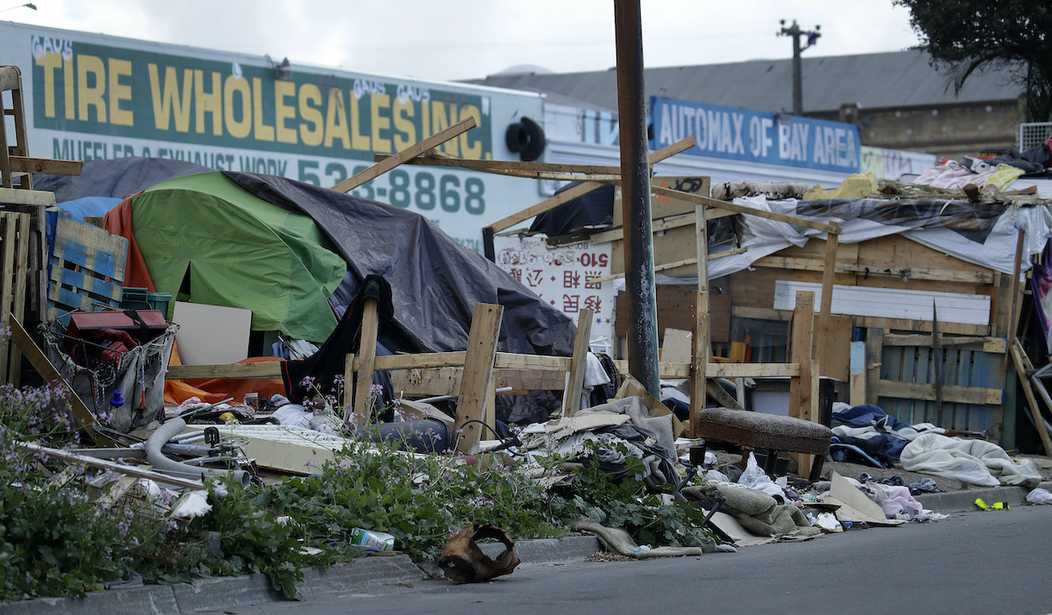States around America, including some of the bluest, have recently taken steps to empty out entrenched homeless encampments on public lands. Even San Francisco and Los Angeles have attempted to break up the makeshift communities where crime tends to flourish and people with drug and alcohol addiction problems congregate. These efforts have not met with a great deal of success yet, but Tennessee has been taking a more confrontational approach this year. Two recent laws, one passed in 2020 and another this year, will make it a felony punishable by up to six years in jail to camp out in parks and on other public lands without a permit. This has both the homeless themselves and advocates working on solutions to the endemic homelessness problem concerned. (Associated Press)
Tennessee is about to become the first U.S. state to make it a felony to camp on local public property such as parks.
“Honestly, it’s going to be hard,” [Miranda] Atnip said of the law, which takes effect July 1. “I don’t know where else to go.”
Tennessee already made it a felony in 2020 to camp on most state-owned property. In pushing the expansion, Sen. Paul Bailey noted that no one has been convicted under that law and said he doesn’t expect this one to be enforced much, either. Neither does Luke Eldridge, a man who has worked with homeless people in the city of Cookeville and supports Bailey’s plan — in part because he hopes it will spur people who care about the homeless to work with him on long-term solutions.
Other states like Texas have introduced new regulations on public camping, but only Tennessee has made it a felony. But as noted in the excerpt above, even the sponsors of the new law don’t expect to see anyone actually prosecuted and imprisoned over it.
Tennessee’s failure to come up with a long-term solution to the epidemic of homelessness shouldn’t come as any surprise. Nobody has made much progress on this issue despite vast amounts of money and resources being poured into various efforts. But lawmakers have to respond to public concerns and many people are indeed alarmed about these homeless encampments. They tend to be populated with people suffering from mental illness and those with chronic substance abuse problems. Crime is rampant and many of the homeless themselves wind up falling victim to predators. Local residents frequently feel threatened by what is typically referred to as “aggressive panhandling.”
But how does making homeless camping a felony solve anything, particularly when they don’t expect to really enforce the law? Locking up the homeless in jails and prisons isn’t going to work because there aren’t nearly enough cells to hold even a significant fraction of the homeless. And if you’re not doing anything to address the mental health and addiction issues of these people, all you’re doing is kicking the can down the road until they are released and then the cycle starts all over again. Additionally, it will be even harder for those who truly want help and to transition back to a normal, housed life if they have a felony on their record when applying for a job.
I’ve long since given up on trying to figure out a plausible, long-term solution that would work. Part of the problem, as noted even by advocates who work with the homeless, is that some people simply do not want the type of help government programs seek to provide. If you physically remove them to shelters, some will check out almost immediately rather than be subject to curfews or rules against alcohol and drug use. Giving every homeless person their own free apartment and food supplies is not only financially impossible, but it would foster resentment among those who have to work for a living and pay their bills.
Perhaps the solution involves going to each community and identifying those who are truly interested in getting help and willing to follow the rules to do so. Prioritize them for space in shelters and enrollment in mandatory mental health and substance abuse programs. For all the rest, cities may need to simply establish permanent camping locations away from business districts and residential areas with food banks and public showers and bathrooms provided. It’s not a very satisfying answer and it will cost money, but I honestly can’t think of any sort of perfect, one-size-fits-all solution.








Join the conversation as a VIP Member